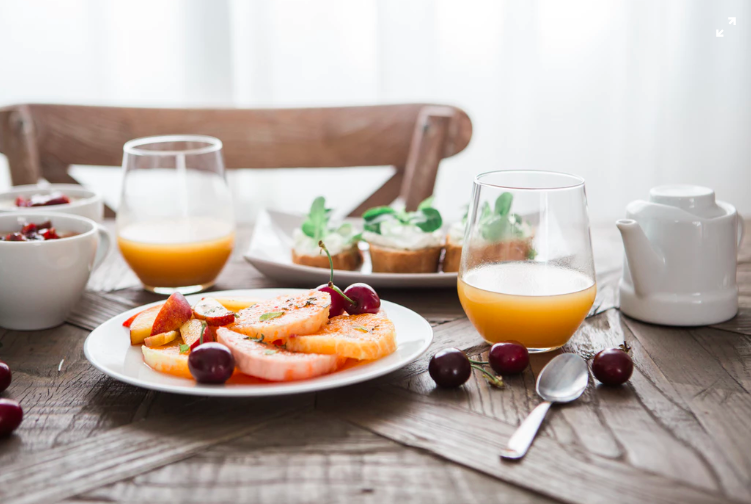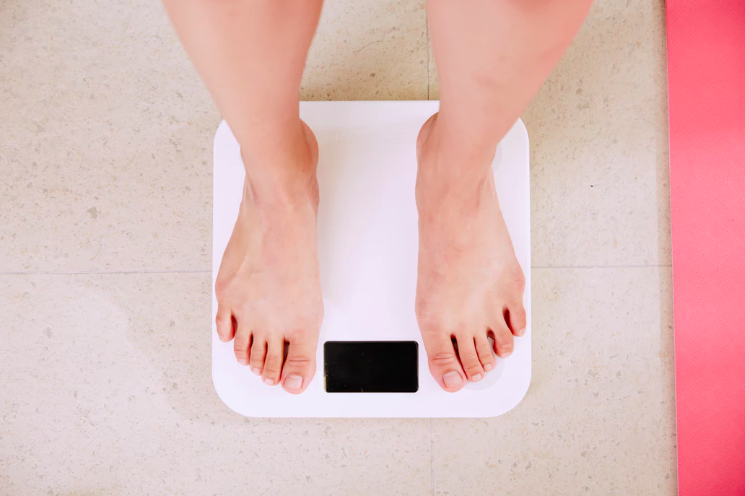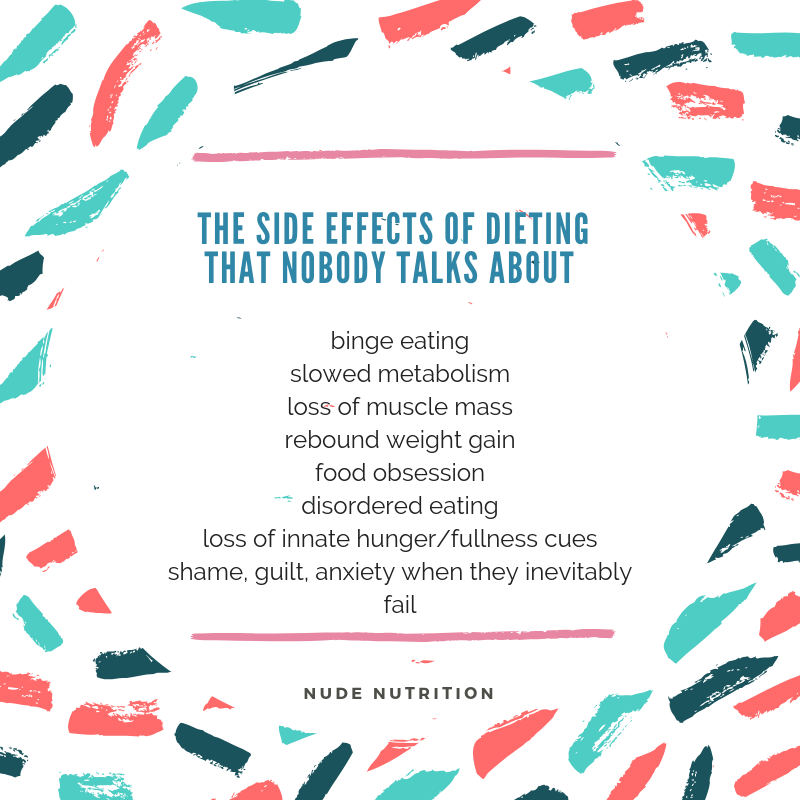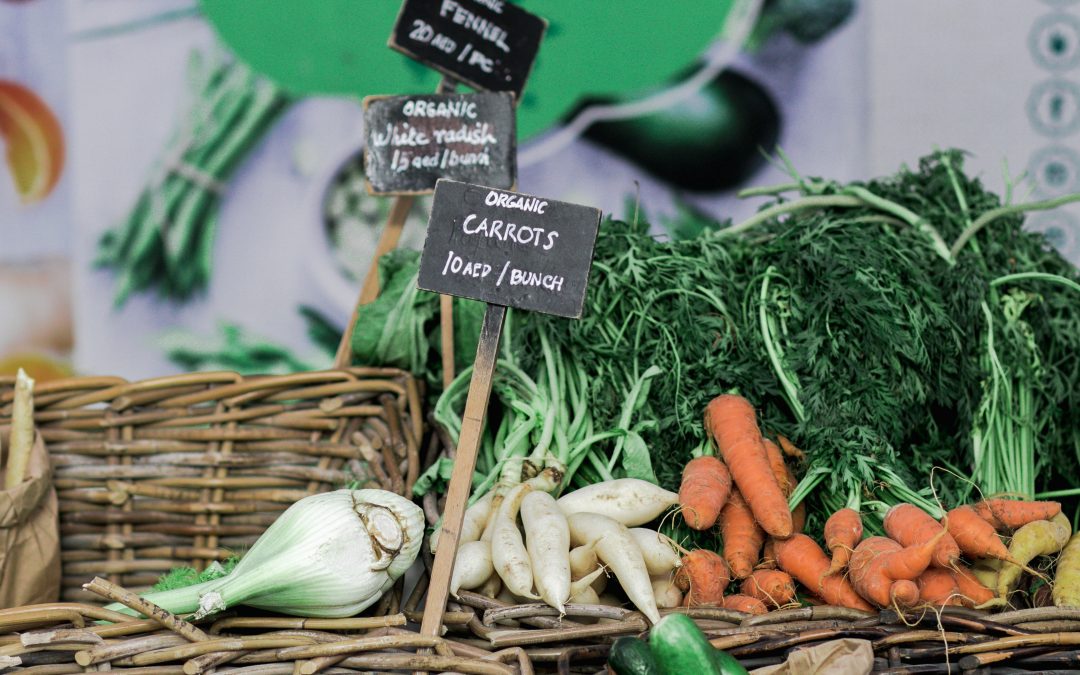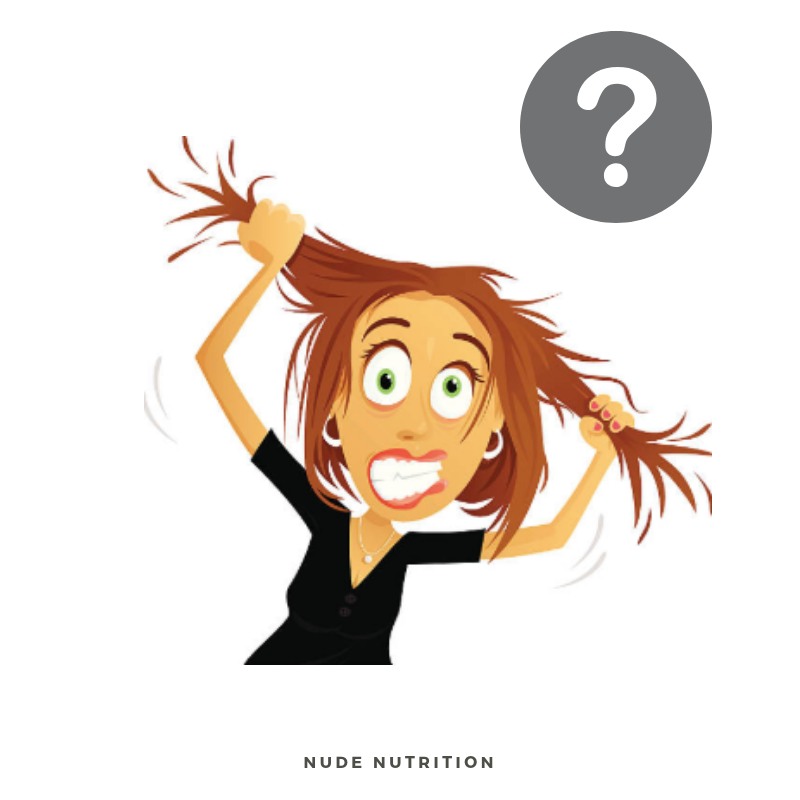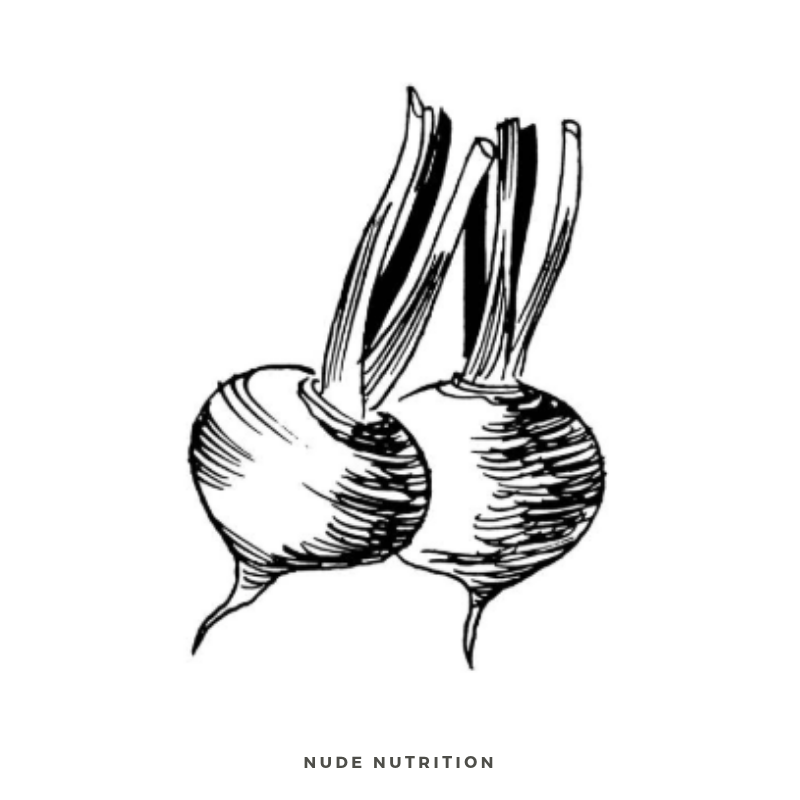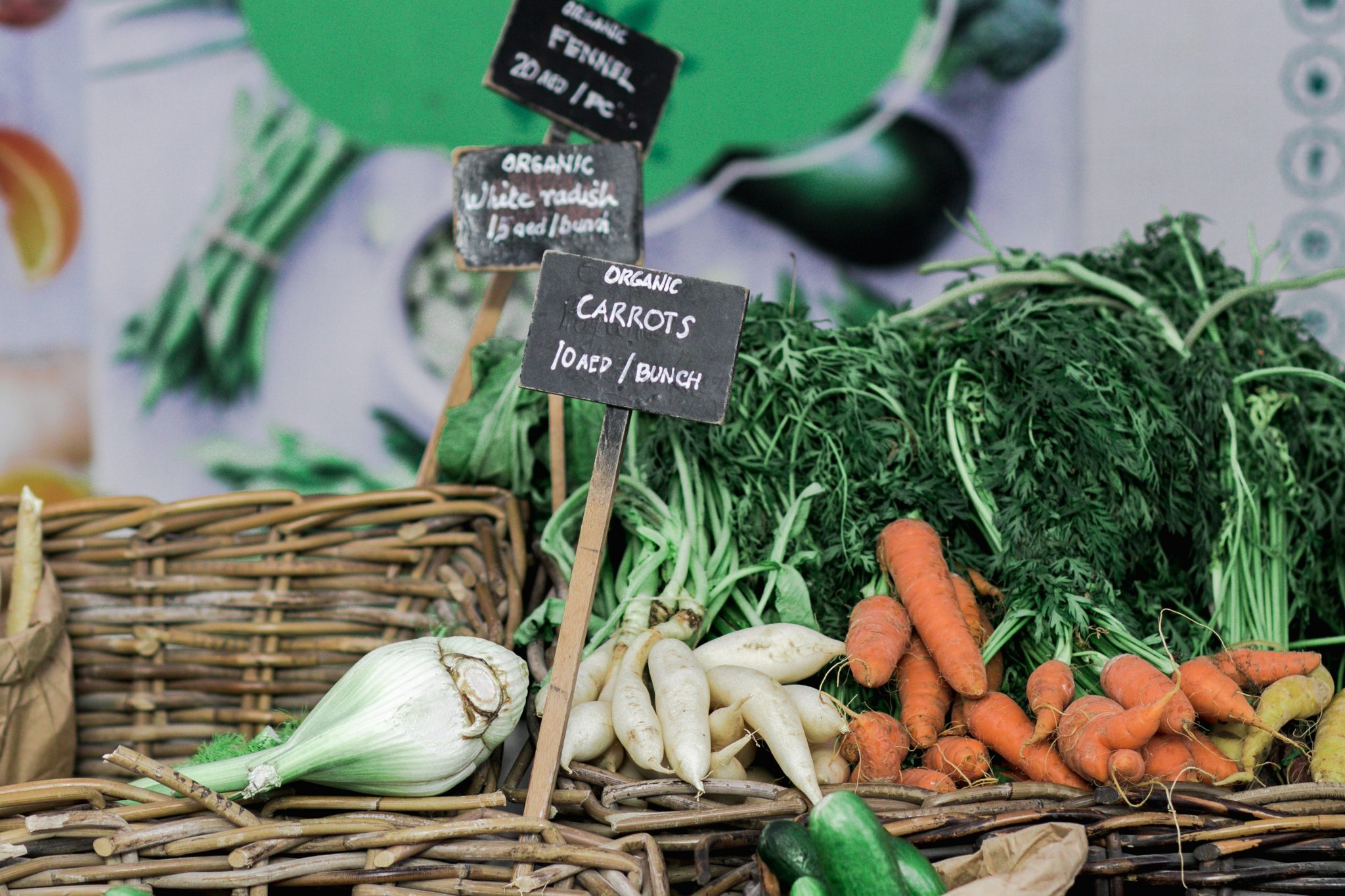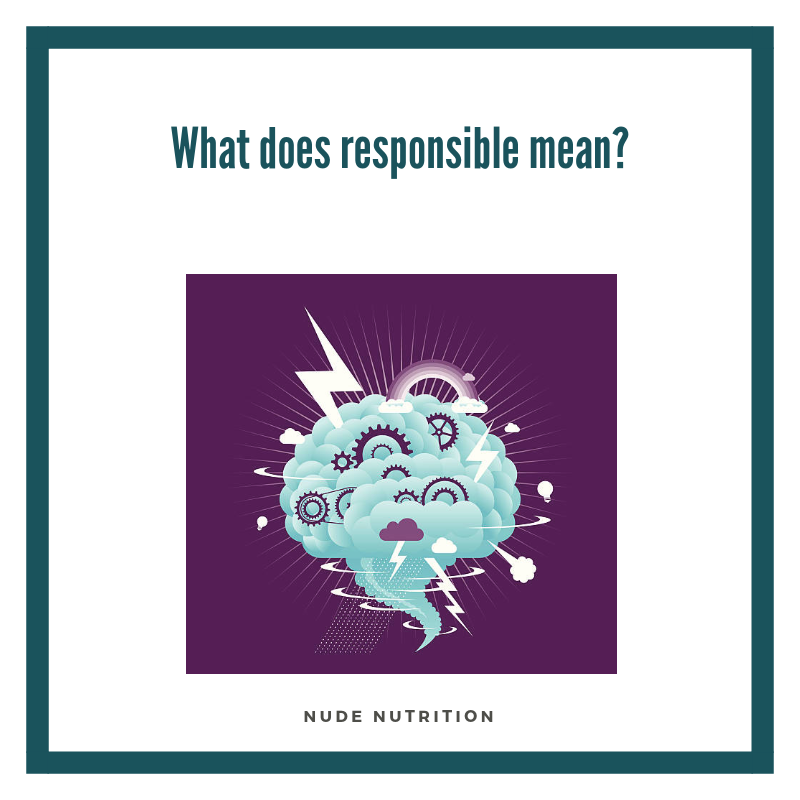Why you don’t need to stop eating sugar to improve your health
First it was salt. Then fat. Then carbohydrates.
Now we’re told to stop eating sugar.
All these foods have been demonised at one point or another over the years and we’ve been taught to fear them due to the implications they can have on our health. But sadly, this is more fear mongering, than fact.
Let’s talk about the facts, specifically regarding sugar.
Have some “wellness experts” left you believing that you need to “stop eating sugar” or that “you’re addicted to sugar“? Sugar is nothing to be feared, unless it is consumed in huge quantities (like anything, really!), or you have specific health conditions like Diabetes, where sugar intake needs management.
The problem with the idea that we should “stop eating sugar” is that not all sugars are equal. If we stop eating sugar, we’d be quitting entire food groups and all the important vitamins and minerals found in them!
Hang on, I thought sugar was bad, because it’s the stuff in cakes, biscuits and sweets, I hear you ask?
Yes and no.
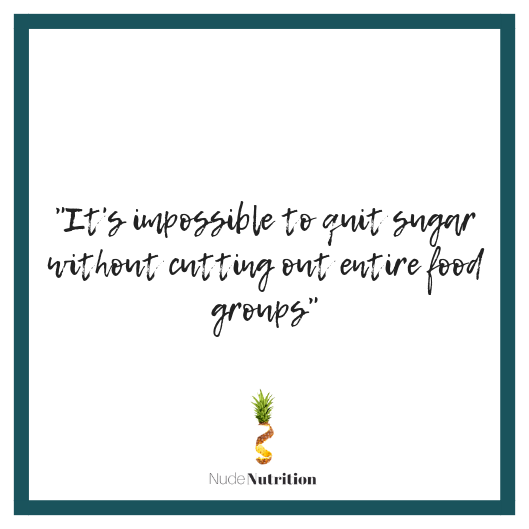
Yes, there is sugar in our favourite sweet treats, but this is usually refined sugar (table sugar). Consuming this type of sugar in small amounts is not harmful to our health (1). It is recommended that we consume sweet foods with meals as much as possible to protect our teeth, however, cutting out sugar from our diet all together could backfire and we could end up feeling like we can’t stop eating it. Especially in those who want to stop food obsession, or who struggle with binge eating, feeling out of control at night, or want to stop emotional eating (2, 3, 4).
The other type of sugar that shouldn’t be feared, is the naturally occurring sugar found in fruits, vegetables, dairy products and wholegrains. But more about these two things later.
Let’s first look at what a sugar actually is. I apologise, but there is a little bit of chemistry ahead.
The chemistry…
A sugar is something that is made up of carbon, hydrogen and oxygen atoms (a sugar molecule). The number of these atoms and how they are arranged, will determine the kind of sugar it is, how it behaves in food and then how it interacts once it is in your body.
There are many different types of sugars found in foods.
For example, the sugar found in dairy products (lactose) is different to the sugar in fruit (fructose) – they are completely different sugars and digested in different ways, but they are sugars nonetheless.
If we were told to quit eating sugar, we’d essentially be eliminating dairy and fruit out of our diets!
And we’d also be eliminating cereals, pasta and rice … because the complex carbohydrates found in those foods are also made up sugar molecules – lots of them (hence the name “complex”).
Sugar, at its most basic level, is what our body needs for fuel.
But what about blood sugar levels?
One reason why there is fear surrounding sugar is because of its impact on our Blood Glucose Levels (BGLs). You might have heard someone say “oh don’t eat that, it makes your blood sugar spike”?? This is semi-true. Yes, dramatic spikes in our BGLs can affect our energy levels. Also, eating foods that are high in sugar and low in fibre could cause hunger to reappear more quickly after eating. But this all depends on the type of the sugar that is in the food and what we eat the sugar with (e.g. protein and fats).
We can measure how quickly a carbohydrate food makes your BGLs rise by using an international standard called the Glycaemic Index (GI) (5). Carbohydrates are rated on a scale between 0 – 100 depending on how quickly the body breaks it down to be used for energy.
Foods with a higher GI are broken down more quickly and can cause a sharp rise in BGLs – things like a glass of sugary drink on an empty stomach, white bread, white rice and white potatoes. However, who just eats a plate of white rice, or a whole lot of bread without a topping? No judgement if you do, but most of us prefer these with other foods most of the time. We usually eat these foods with some proteins and fats which naturally lower the GI.
Foods with a low GI number break down more slowly and help to keep your BGLs stable – things like wholegrain bread and pasta, fresh fruit, lentils and legumes, yoghurt and milk. In fact, chocolate is low GI because it contains a high amount of fat and protein… I bet you never realised that!
So, what’s important is the type of sugar and what we pair it with, to determine its nutritional quality and impact on your body, rather than tarnishing all sugars with the same brush!
Naturally occurring sugars vs “free sugars”
Now that we know what a sugar is, we can talk about naturally occurring sugar vs “free sugars”.
Natural sugars, as the name would suggest, are those already found in the food. These often come with a host of other beneficial nutrients. For example, milk and yoghurt contains the sugar lactose as well as calcium and protein. Fresh fruit contains fructose, as well as vitamin C and fibre.
So, what exactly are “free sugars”?
The World Health Organisation (WHO) defines it as those that are added in by either the consumer or the food manufacturer and the sugars naturally found in fruit juice, honey, syrup and fruit juice concentrates. Things like bakery items, cakes, cookies and soft drinks. It also includes the table sugar you add to your coffee in the morning.
The WHO recommends limiting free sugars to no more than 10% of total daily energy intake (about 10 teaspoons) to reduce the risk of dental carries, chronic disease and poor diet quality (6).
What about alternative sweeteners then?
If we’re told that we need to reduce our sugar intake, additives and preservatives, should we turn to sugar substitutes instead? Well there are loads of sugar alternatives being used, many so that recipes can claim they’re “sugar free”, but it’s difficult to know whether they’re any better than just your regular old table sugar.
Let’s have a look at some.
Maple Syrup
What it is: More commonly used as a weekend breakfast item, but it is also used in recipes as a table sugar replacement. The syrup is formed after the sap is extracted from the wild maple tree and concentrated.
Nutrients: Contains traces of vitamins and some minerals such as potassium, iron and calcium.
GI: 54 (7).
Brown rice malt syrup
What it is: An expensive replacement often used by people who follow a “sugar free” lifestyle. It is produced by cooking brown rice flour or starch and breaking it down into simpler sugars to produce a liquid.
Nutrients: It is low in fructose and could be a suitable replacement for people with fructose malabsorption.
GI: 98 (7)
Agave syrup
What it is: A very sweet sugar alternative with minimal impact on BGLs. Processed from the agave plant grown in the south west of the USA and northern parts of South America.
Nutrients: Is high in fructose, which could cause digestive distress for people with fructose intolerance. Has slightly higher calories than table sugar, 60 calories per tablespoon compared to 40 calories for the same amount of table sugar (8).
GI: 10 (7).
Dates
What it is: A whole fruit
Nutrients: Contains fibre, potassium (essential for maintaining fluid balance in the body and controlling electrical activity in the heart) and magnesium (essential for proper nerve function, muscle contraction and regulation of blood glucose level and blood pressure)
GI: 50 (7)
Stevia
What it is: Made from the leaves of a native plan in Paraguay in South America, is often used in coffee as a replacement for table sugar in coffee.
Nutrients: It is much sweeter than table sugar, with negligible calories and does not raise blood sugar.
GI of 0
Coconut sugar
What it is: Made from the sap in the flower buds of a coconut palm. The sap is boiled to allow the water to evaporate and then dried to form a concentrate. It is
Nutrients: Contains potassium, iron, zinc, and calcium according to research conducted by the Philippines Government research body, but you need to eat a lot to make a difference (9). It also contains the same number of calories as white sugar.
GI: low GI of 54 (7)
So, while there are many pros and cons on just this short list of the many alternatives that are available, the reality is that they are all still sugars and most of them contain energy, with little vitamin or minerals (10). And whilst sweeteners are low in calories, there is some evidence that sweeteners may actually increase our appetite (11).
Summary
So, with all the scaremongering around sugar being harmful, the reality is that a diet that has a limited intake of sugar (whatever sugar that may be) is not harmful for a healthy individual.
There are many foods with naturally occurring sugars that contain nutrients that are highly beneficial, so let’s not go cutting those just yet.
And then as for those free sugars which have little nutritive value? Well, a little bit of honey on toast or glazed on roast carrots can fit into a healthy diet. These foods are there for the enjoyment and satisfaction of eating and cutting them out completely could backfire and result in food obsession and binge eating. After all, who was it that once said a spoonful of sugar helps the medicine go down?
If you want to learn more about how to have a healthy relationship with food, reduce food obsession, and feel more in control around sugar, learning about Intuitive Eating is a good place to start.
Note: this article is not designed to replace individual advice from your healthcare provider.
References
- The British Dietetics Association. (2017). Sugar. Retrieved from https://www.bda.uk.com/foodfacts/sugar. Accessed on 1/03/2019.
2. Keeler, Chelsey L., Richard D. Mattes, and Sze‐Yen Tan. “Anticipatory and reactive responses to chocolate restriction in frequent chocolate consumers.” Obesity 23.6 (2015): 1130-1135.
3. Konttinen H, Haukkala A, Sarlio-Lahteenkorva S, Silventoinen K, Jousilahti P. Eating styles, self-control and obesity indicators. The moderating role of obesity status and dieting history on restrained eating. Appetite (2009): 53:131–4.
4. Jansen, Esther, et al. “From the Garden of Eden to the land of plenty: Restriction of fruit and sweets intake leads to increased fruit and sweets consumption in children.” Appetite 51.3 (2008): 570-575.
5. International Organisation for Standardisation (2010). Food products — Determination of the glycaemic index (GI) and recommendation for food classification. Retrieved from https://www.iso.org/obp/ui/#iso:std:iso:26642:ed-1:v1:en. Accessed on 1/03/2019.
6. WHO. (2015). Sugar intakes of Adults and Children. Retrieved from. https://www.who.int/nutrition/publications/guidelines/sugars_intake/en/. Accessed on 3/03/2019.
7. The University of Sydney. (2017). Search for the Glycemic Index. Retrieved from http://www.glycemicindex.com/foodSearch.php. Accessed on 1/03/2019.
8. Web MD. (2014). Agave: Calories, Nutrition Facts, and More. Retrieved from https://www.webmd.com/diet/features/the-truth-about-agave#1. Accessed on 1/03/2019.
9. Medical News Today. (2018). Coconut sugar. Is it good for you? Retrieved from https://www.medicalnewstoday.com/articles/323047.php. Accessed on 1/03/2019.
10. NHS Choices. (2016). Are sweeteners safe? Retrieved from https://www.nhs.uk/live-well/eat-well/are-sweeteners-safe/. Accessed on 1/03/2019.
11. Web MD. (2018). Is there such a thing as healthy sugar? Retrieved from https://blogs.webmd.com/food-fitness/20181004/is-there-such-thing-as-healthy-sugar. Accessed on 1/03/2019.



